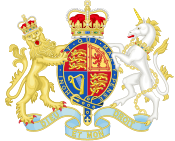- Her Majesty's Most Loyal Opposition (United Kingdom)
-
United Kingdom 
This article is part of the series:
Politics and government of
the United KingdomGovernment- Sovereign
- Queen Elizabeth II
- The Crown
- Royal Prerogative
- Privy Council
- Cabinet
- Her Majesty's Civil Service
Foreign policy
Her Majesty's Most Loyal Opposition, or the Official Opposition, in the United Kingdom is led by the Leader of the Opposition. This is usually the political party with the second-largest number of seats in the House of Commons, as the largest party will usually form Her Majesty's Government. Since May 2010, the Official Opposition has been the Labour Party.
Contents
Origins
The phrase His Majesty's Opposition was coined in 1826, before the advent of the modern two-party system, when Parliament consisted more of interests, relationships and factions rather than the highly coherent political parties of today (although the Whigs and Tories were the two main parties). Attacking the Foreign Secretary, George Canning, in the House of Commons, John Hobhouse said, "It is said to be hard on His Majesty's Ministers to raise objections of this character but it is more hard on His Majesty's Opposition to compel them to take this course."
The phrase was widely welcomed and has been in use ever since.
Opposition days
Whilst most days in the House of Commons are set aside for government business, twenty days in each session are set aside for opposition debates. Of these days, seventeen are at the disposal of the Leader of the Opposition and three can be used by the leader of the smaller, or Tertiary, opposition party (for most recent history this has been the Liberal Democrats).[1]
Although the Opposition has no more formal powers in setting the Parliamentary agenda, in reality they have a certain influence through a process known as the usual channels.[1]
Leader of the Opposition
Main article: Leader of the Opposition (United Kingdom)The Leader of Her Majesty's Most Loyal Opposition is often seen as the Prime Minister-in-waiting; as well as his salary as an MP, he or she receives a statutory salary and perquisites like those of a cabinet minister, including appointment as a Privy Councillor. Since 1915, the Leader of the Opposition has, like the Prime Minister, always been a member of the House of Commons. Before that a member of the House of Lords sometimes took on the role, although often there was no overall Leader of the Opposition.
Although there has never been a dispute as to who holds the position, under the Ministerial and other Salaries Act 1975, the Speaker’s decision on the identity of the Leader of the Opposition is final.[1] The current Leader of the Opposition is Ed Miliband, elected leader of the Labour Party on 25 September 2010.
Ministers' Questions
Prime Minister's Questions
Main article: Prime Minister's QuestionsThe most public parliamentary function of the Leader of the Opposition is Prime Minister's Questions (PMQs), currently a 30-minute session held on Wednesday afternoons when Parliament is sitting. The Leader of the Opposition has six questions, which he usually splits into two sets. Other backbench opposition MPs also have the right to question the Prime Minister; they are selected either through a ballot, or by "catching the Speaker's eye". By convention, other Shadow Cabinet members do not question the Prime Minister at PMQs, except when standing-in for the Leader.
Other Ministers' Questions
Every government department is subjected to questions in the House of Commons and the House of Lords. As with PMQs, the official opposition spokesmen are allocated a number of questions, and in addition backbench MPs are free to ask questions. In the House of Lords, opposition spokespeople also question the government. This is one of the reasons why every government department (and opposition shadow department) has at least one member of parliament and one peer in it.
Seating
As is usual with Westminster systems, and other statutory assemblies and councils in the UK, the government and its supporters sit to the Speaker's right, whilst the Opposition parties sit to his/her left.[2] Currently, members from the Conservative and Liberal Democrat parties (which form the Government in coalition) sit to the Speaker's right, and members from the Labour Party and other minor parties sit to the Speaker's left.
See also
- Leader of the Opposition (United Kingdom)
- Official Opposition frontbench
- Official Opposition Shadow Cabinet (United Kingdom)
- Parliamentary opposition
Notes and references
- ^ a b c Standard Note:SN/PC/3910 UK Parliament, 8 February 2006, accessed 5 May 2010
- ^ Opposition BBC News, 19 January 2006, accessed 3 June 2006
Categories: - Sovereign
Wikimedia Foundation. 2010.
